Table of Contents
ToggleNo Pain, Only Gain
We are here to lessen some pain from your life. IVF treatment with Aastha Fertility is affordable, painless, and yet highly successful. Speak to Us Now
In vitro fertilization is a series of convoluted treatments in which medical representatives fertilize a woman’s egg with a man’s sperm in a Petri dish. It is used to aid fertility, assist in conception, and avert genetic issues.
In the IVF process, mature eggs are taken out from ovaries and then fertilized with sperm in a lab. Then the medical representative transports the fertilized eggs/egg to a uterus. It takes approximately three weeks to finish IVF cycles.
Like any other fertility treatment, IVF treatment also involves medication through injections that help with fertilization, implantation, and embryo development. There are two kinds of injections taken by you during your IVF treatment. Firstly, it includes Subcutaneous injections-Lupron, Gonal-F, Follistim, and Menopur. These are given under the skin with a very fine needle.
Secondly, intramuscular self-injection is required for hCG injection, which is done a few days after egg retrieval.
Many People ask Is IVF Painful? IVF is not as painful as you must hear about. It consists of multiple steps and requires an extensive procedure, including numerous injections and other medications. These combinations of injections, drugs, and surgical procedures substantially make the IVF journey successful.
Sharing complete details for all the injections our patients have to take during IVF treatment makes our treatment process more transparent to them. Our patients felt more confident and prepared when we shared every small detail. Some of the common questions regarding IVF injections are shared below in this blog.
Why are Medications and Injections Important During IVF Treatment?
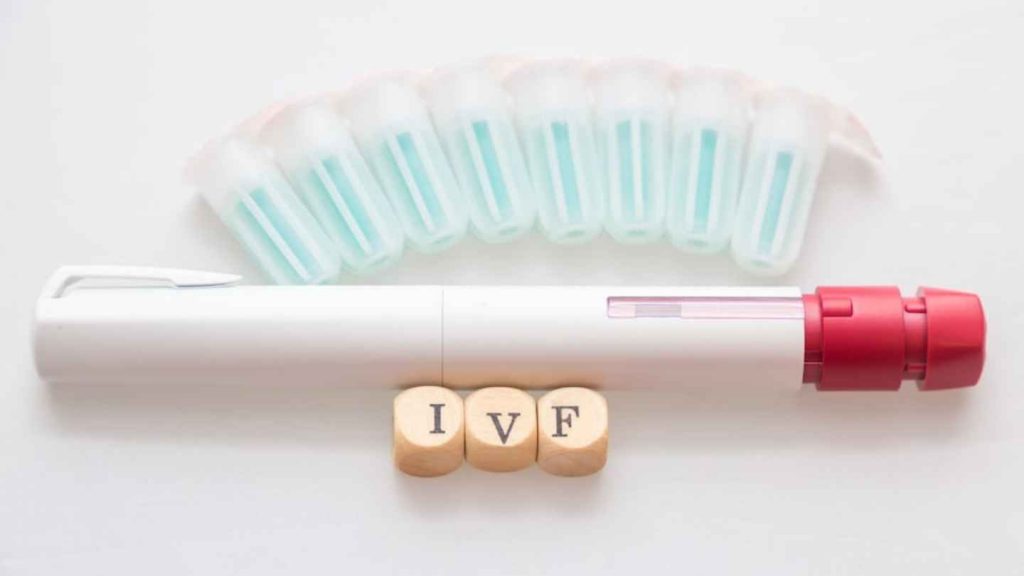
You have read that a woman needs to take multiple medications and injections until now. But what is the use and purpose of the same?
During the IVF procedure, a woman needs to be stimulated with injected medicines or fertility shots that will help promote multiple egg development. Therefore, these injections are given through a tiny needle, like insulin is given to diabetic patients.
Two different types of injectable medicines are given during IVF cycles, one is to stimulate egg development, and the other is to keep the eggs from ovulating prematurely. These medications trigger the release of different hormones that help stimulate egg maturation and production while regulating ovulation. Women are made more fertile with these injections during embryo transfer and retrieval procedures, improving their chances of a successful pregnancy.
The Role of Fertility Medications in The IVF Process
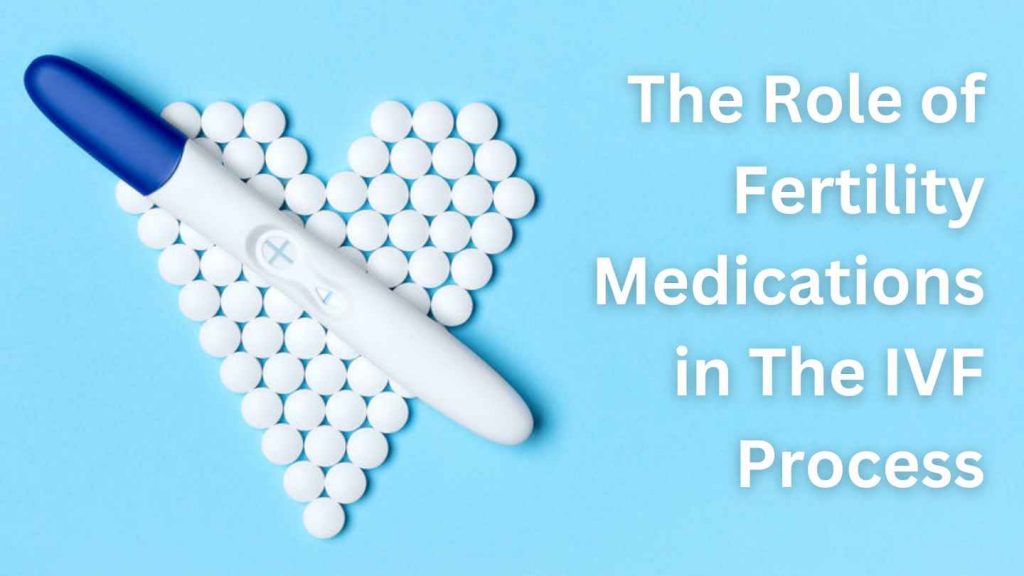
The goal of fertility drugs is to “save” the eggs so they can continue to develop. A woman would have more eggs to fertilize if this occurred. Additionally, this increases a woman’s probability of becoming pregnant by enabling the embryologist or IVF practitioner to choose the best egg or eggs for fertilization and embryo formation.
Using Oral Contraceptives
Although it may seem unusual, medical representatives may initially use oral contraception to control and manage your cycle throughout IVF.
Downregulation Medications (such as Buserelin, Cetrotide)
Doctors must suppress your regular ovarian activity to obtain the numerous mature eggs required for IVF. Medications are used that ‘switch off’ natural ovulation and hormones, known as downregulation, to achieve successful follicle growth. The follicles in the ovaries are home to the eggs. Self-injections under the skin are used to administer these medications daily.
Follicle Stimulating Hormones/Gonadotrophins (such as Menopur, Gonal-F, Bemfola, and Meriofert)
Doctors use drugs called gonadotrophins, which include follicle-stimulating hormones, to stimulate follicle growth.
These can also be injected subcutaneously or beneath the skin. Throughout this time, doctors keep an eye on you and check your blood and ultrasound after a few days so they can monitor the growth of your follicles.
hCG (such as Pregnyl, Gonasi, Ovitrelle)
A human chorionic gonadotrophin, or hCG, injection is required when scans and testing reveal that your follicles are the proper size. Due to this medicine, your eggs enter a final development phase, making them suitable for IVF fertilization.
Progesterone and Oestrogen (such as Evorel and Cyclogest)
Doctors administer progesterone medication after egg collection to prepare for embryo implantation and pregnancy. The use of progesterone medication in combination with estrogen is also necessary for frozen embryo transfers or donor egg conceptions.
Factors That May Affect The Number Of Injections Needed For An Individual’s Ivf Treatment
The number of injections for IVF given to a woman depends on her IVF plan, as each IVF plan is different. Some of the factors that could affect the number of injections needed are:
Age: Your age is a big factor. The younger you are, the more chances are that you have healthy eggs; the dosage of injections will depend on that.
Embryo Development: The medication dosage also depends on how fast your embryo develops and what development process it can tolerate.
Infertility cause: Your cause of infertility will decide your course of medication.Lifestyle: Your lifestyle factors or history are also considered while deciding your medicine dosage.
What to Expect from The IVF Injections?
The IVF injection is an injectable medicine that promotes ovulation. These drugs enable your doctors to control ovulation from the start of treatment. Throughout ovulation, the doctor will examine the ultrasound and blood tests, focusing on estradiol levels and the development of oocytes. So this will allow the physician to modify the dose as necessary. So when getting IVF injections, a woman may experience:
- Changes in body and greater appetite levels: Hormonal injections may influence weight and basal metabolic rate (BMR). Further, your hunger and satiety may rise, and this might be from treatment-related drugs. Rapid weight gain requires medical attention.
- Mood swings or behavioral changes: Hormonal injections may cause emotional responses and mood swings. Some parents find IVF daunting and may be emotional, sometimes deviating from their regular activities.
- Issues relating to Gastrointestinal: Constipation and diarrhea are common hormone injection adverse effects. So eat a nutritious diet full of fiber and water.
Stress and anxiety: Hormonal injectable and fertility treatments might cause stress and anxiety. Regular doctor visits and stress-relieving exercises like yoga and meditation relieve symptoms.
What Are the Injections One Has to Take During the IVF Treatment?
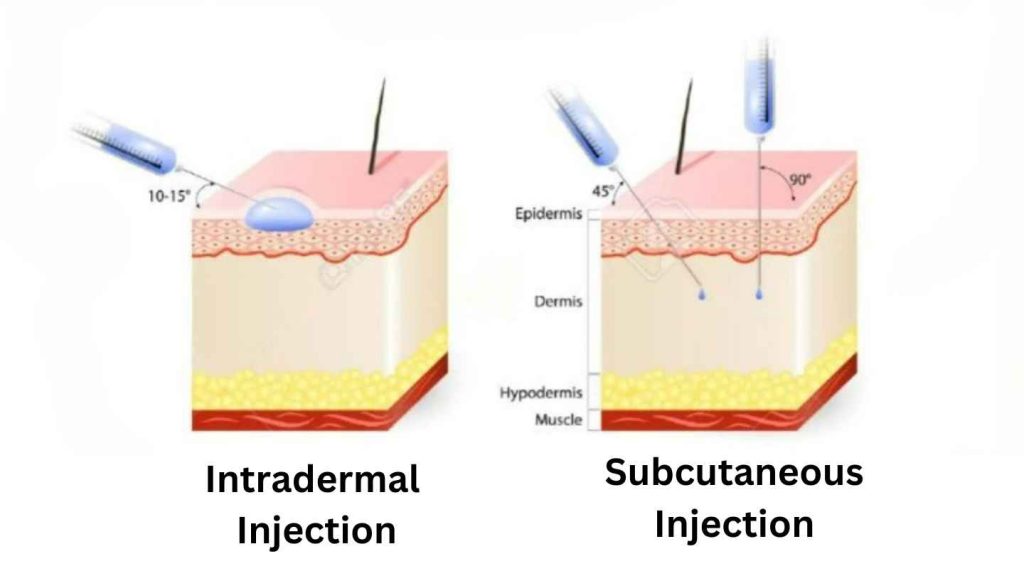
Before digging into more details for these injections, let’s first clarify that not every woman finds this injected medicine painful. Only for some of them, these are unpleasant, causing discomfort only for a few seconds. There are two different types of injections that you will experience through your IVF procedure-
Subcutaneous Injections:
This shot involves the medications inserted through a small needle under the skin. Gonal-F, Lupron, Menopur, and Follistim have commonly used fertility subcutaneous injections, which cost around 270 per box. These are usually injected on the thigh or the belly, just like the insulin shots given to diabetic patients. These will only give a pinching sensation to the patient, giving a feeling of slight stinging or tingling.
Intramuscular Injections:
This injection is used to insert the fertility medicine directly into the muscles using a comparatively longer needle. HCG trigger shot or progesterone oil is usually used as an intramuscular injection, given on the top outer quadrant of the buttocks. Some people administer these shots by themselves or with their partner’s help, but it is best to seek a professional’s help for support.
Other than these two injections, ICSI Injection is also a significant part of IVF treatments, primarily used in the severe cases of male factor infertility. Before a man’s sperm is used to fertilize a woman’s egg, the head of the sperm must be attached outside the egg. Once attached, it then pushes the egg’s outer layer called the cytoplasm, where fertilization occurs.
There are cases when the outer layer may become thick, become hard to penetrate, or the sperm may not swim. ICSI Injection helps in these cases, further helping with egg fertilization.
Oligospermia is also one of the male’s infertility issues characterized by lower sperm counts. Ramipril is used to treat Oligospermia, increasing the sperm count and helping maintain an ejection.
Bulky Uterus also demands proper medications during IVF treatment. The Uterus is the main reproductive organ that helps nourish the fetus until birth. A bulky uterus occurs when the uterine walls swell up, increasing its usual size. Medications and injections and a proper diet are suggested to get rid of a Bulky Uterus.
How Many Injections are Used During IVF Treatment?
The most asked question is how many injections for IVF treatment? Medications for IVF treatment are often administered subcutaneously (straight into the fat immediately beneath the skin) or intramuscularly (directly into the muscle). Depending on the individual therapy and cycle, “a patient might receive 1–2 injections daily, approximately 90 injections each cycle for 9 to 14 days“.
These drugs may include gonadotropins: luteinizing hormone (LH) and follicle-stimulating hormone (FSH). So these encourage the ovaries to produce healthy follicles and eggs. Typically, an additional hormone, progesterone, is released spontaneously following ovulation. In some individuals undergoing IVF, inadequate progesterone levels are reported; hence, the doctor may prescribe progesterone supplements. The supplementation begins around the egg retrieval time or ovulation and extends until the pregnancy maintains the progesterone levels.
When is the best time for IVF Injections?
IVF treatment cycle starts on the first day of your period. Antagonists and stimulation injections are most commonly used for IVF treatment. It does not matter whether you take stimulation injections in the evening or morning. But, the late evening is the best time for antagonist injections.
How to make taking the IVF Injections Process Easier?
IVF provides several problems, and injections are among them, particularly for women with a lower pain threshold. Several techniques and practices may help alleviate pain and associated discomforts.
- Inform yourself about the procedure of IVF stimulation injections, its associated side effects, and how to treat them symptomatically.
- See an expert specializing in cognitive-behavioral therapy (CBT) to combat the fear of needles and injections. Because the treatment involves up to 90 shots, this is the case. Learn the techniques of pinching and tightening the skin to mimic the injecting pinch.
- Utilize an ice pack or heat pack to create a numbing effect on the area. For the subcutaneous injection, 15–30 seconds of chilling is sufficient for numbing the nerves; however, in the case of intramuscular injection, 10–15 minutes of warming will loosen up the muscles and make them more pliable for injection.
Administration Of Injections
The female is stimulated during IVF, with medicines administered subcutaneously. A tiny needle is used to administer subcutaneous injections just beneath the skin.
Follow the following steps to inject yourself at home.
- Decide whether to inject yourself in the abdomen, thigh, or upper arm’s back.
- Use alcohol to clean the area in a circular motion. Before injecting, let the skin dry out to prevent stinging.
- Remove the needle cover carefully, ensuring it doesn’t come loose from the syringe.
- Hold the syringe in a pencil-like grip. Place the needle at a 90-degree angle to the skin surface while squeezing the skin.
- With a darting motion, quickly insert the needle.
- To check for blood, gently pull the plunger back. If none, push the plunger to administer the medication. Immediately take out the needle if any blood is seen. Switch the needle, get a new site ready, and inject once more.
- After administering the drug, release the skin that has been squeezed and swiftly and carefully remove the needle. If there is any bleeding from the area, push gently for 10 to 15 seconds.
Tips For Administering Injections At Home
- Set the alarm to remind you to take injections.
- Check the requirements for the dosage of your drugs in advance.
- Set a station where you keep everything you need, for example, alcohol wipes, needles, medicines, cotton, etc.
- Apply the ice after the shot. It helps reduce discomfort.
- Switch the spot you inject yourself. Injecting at the same site can cause pain.
You can also seek professional help administering the injection if you are uncomfortable with injecting yourself. You can also seek help from a professional to learn to give yourself shots.
Are IVF Injections Painful?
As we have already discussed, injected medicines are an essential part of the IVF process that cannot be ignored. This helps stimulate the ovaries to produce mature eggs harvested with healthy sperm. Pain in these injections is primarily subjective, varying differently for different people. Some sensitive ones might experience more pain and discomfort than strong ones.
Moreover, these injections only give the skin a slight pinching or stinging-like sensation. Instead, a woman might experience more pain during the IVF process, as needles are not usually comfortable for everyone. Therefore, it is suggested to come with your partner during your injection appointments to support you throughout the process.
Apart from this, another factor that might trouble you is whether these injections have any side effects or not. The doctor will always ask you to inject the medicine intramuscularly or subcutaneously during the IVF procedure. This helps produce the hormones that further act as a messenger within the body.
IVF Injections Schedule
The IVF process demands a list of necessary medications and injections on a precisely timed schedule. Therefore, knowing what you might be prescribed based on the schedule and the potential medication side effects is essential.
Day 1 to 4
The patient is called on the first day of her menstrual cycle to schedule a Baseline for the 3rd of a day visit, including bloodwork and ultrasound. After their approvals, the patient will be given hormone injections, stimulating egg productions for the production of follicles. Gonal F and Menopur are the medications included in this process.
Day 5-10
Patients will continue the stims during this period and may prevent premature ovulation, also known as antagonists. Medications given will block the hormones that cause the release of these eggs from the ovaries.
Common medication in this period includes Cetrotide, Ganirelix, and Leuprolide.
Day 10+
After ten days, patients will have to go for a final ultrasound and bloodwork, which will further confirm whether the follicle pack has matured or not. If yes, a trigger shot is assigned before at least 35-36 hours of retrieval, stimulating ovulation and a final growth spurt.
Trigger Shots support the normal egg development in a woman’s ovary, triggering it to go through a final spurt. This also stimulates egg release during ovulation from the follicles within 36 hours.
Common medication in this period includes Novarel/Pregnyl, Ovidrel, and Leuprolide.
Side Effects of IVF Injections on a Female’s Body
According to ASRM [American Society for Reproductive Medicine], there are some side effects or possible reactions from IVF Injections, and the following steps can be used to cure them-
- Mood Swings
- Headache
- Hot Flashes
- Reduced or Increased appetite
- Bloating
- Nausea
- Soreness at the injection’s site
- Breast tenderness
- Menstrual spotting or bleeding
- Fatigue
- Decreased libido.
It is also unnecessary for everyone to have these side effects, as some women experience none. Also, these are usually temporary and easily manageable. There are only one in a thousand cases when a woman might experience other unexpected reactions from these injections, like OHSS (ovarian hyperstimulation syndrome).
This happens when a woman has multiple follicles growing, and the symptoms for the same include nausea, bloating, and weight gain. These symptoms can also be treated through proper hydration and rest at home.
Steps can be used to cure the Side Effects of IVF Injections on a Female’s Body:
Good doctor-patient communication: Always discuss when and how to take your medications with your doctor. They can recommend routines and procedures that lessen discomfort. Avoid suffering in silence if you have adverse effects.
Continual observation by your fertility team: This is related to having clear communication. To ensure that any side effects do not escalate into more serious concerns, the doctor will also want to monitor any adverse effects closely. It will allow them to quickly cease, switch medications, or carry out other treatments.
Remain hydrated: Throughout any fertility therapy, drink a lot of water because the hormones might make you feel worse and cause severe dehydration. Throughout your treatment, even though it might seem counterproductive due to the bloating, be sure you consume more water than usual.
Dress in layers: If you experience heat flashes, dress in layers. Additionally, you might want to avoid consuming hot beverages because they could cause a hot flash. Taking away a layer when it gets hot may be helpful.
Wear Comfy clothes: Wear loose pants or dresses when you feel bloated.
Tips To Reduce IVF Injection Pain And Make Injectable IVF Medication Smooth
Give yourself some time and space to make the injections quick and easy. There are some quick tips that you will find helpful, making the injection process smoother-
- Sit Back and Relax- If you tense your muscles while shooting anticipation, the same will hurt more. Instead, try out deep breathing and relaxing exercises before the injection appointments, depressing the plunger.
- Talk to your Nurse- Have a free and open conversation with your doctor or nurse before the appointments, clarifying all your doubts about giving yourself injections. This will further help you feel more confident.
- Go Numb: Ask your doctor to numb the area with anbesol. This is the over-the-counter gel that will help numb your sore gums. But make sure to wipe the same before you do the injection.
- Try Ice or Consider Heat: Apply a heating pad on the injected area for 1 minute during intramuscular injections, as these will help relax the muscle. Icing the area before injection can also help numb that particular area for a few minutes.
- Try Different Needles: Finger Gauge needles are usually the most comfortable options. Also, you need to know that the higher the number, the smaller the needle, making 25-27 gauge the ideal and usually used needles.
The Process of IVF Treatment
IVF is the most effective form of ART (Assisted Reproductive Technology). Doctors or professionals start IVF procedures with the initial fertility medications a woman needs to take to produce mature eggs ready for fertilization. This process is known as ovulation induction. AMH tests are done to check the egg quality of a female as it helps make the fertilization process effective. If a female has a record of miscarriage and IVF failure, then a hysteroscopy test is also done to know the real cause of pregnancy in the patient.
Once ovaries have developed enough mature eggs, doctors go for egg retrieval conducted through a minor surgical procedure done at the fertility clinic. This procedure demands some medications to help with a relaxed and comfortable mind.
The eggs are then mixed with the sperm cells of your partner or any other donor. This process is called insemination, and after this, sperm and eggs are stored together in a petri dish/container for fertilization and embryo formation. Nearly after 4-5 days of egg retrieval, one or more embryos are inserted in the Uterus, called the embryo transfer. These embryos attach to the uterus lining, leading to pregnancy.
Therefore, the IVF process is not that painful as IVF injections are used as a critical piece. These injections help relieve the pain and stimulate the ovaries to produce mature eggs.
In the majority of circumstances, these injections are not very painful. But, as pain is subjective, it varies from individual to individual. Someone less sensitive might not experience a higher level of discomfort than someone more sensitive.
Along with IVF, IUI procedure is also not a painful method to treat infertility. The doctor recommends IUI, so any female can opt for it without thinking twice about pain. Aastha Fertility Clinic also offers a special Fertility Preservation Option that will help you save your eggs if you plan to conceive again in the future.
The total IVF Costs in Jaipur involve all the fertility drugs and medications used for egg maturation inside the female’s body. Therefore, the cost is calculated by professionally suggested treatment, including the medicines required throughout the process.
IUI vs IVF Injections:
Both IVF and IUI are fertility treatments. IVF covers 5 steps
- Pre-cycle testing for diagnostics
- Ovary stimulation for egg production
- Eggs retrieval from every ovary,
- Eggs fertilization in the lab
- Embryo transfer to the uterus.
In IUI, sperm is directly inserted into the uterus. During ovulation, there is a production of one egg collected in the fallopian tube. An IUI results in a higher amount of quality sperm close to the egg. It increases the chance of uniting the sperm and the egg.
| IVF | IUI | |
| No. of Injections | 1–2 injections per day. | Once in the cycle |
| Costs | Rs 2.5 lakhs to Rs 4 lakhs on average | Rs 4500 to Rs. 5000 for a single cycle |
| Success Rate | 40% in young women | 15 to 25 % per cycle |
| Treatment Timeline | A single IVF cycle continues for 2 to 3 weeks. | The IUI procedure can take up to 2 hours. |
| Which is More Painful? | The treatment is not much painful. Some patients have experienced abdominal cramping. | IUI is a minimally invasive treatment, which involves using no anesthesia and pain medication. A few patients have felt a slight pinching sensation. |
Is It possible to have IVF treatment without Injections?
Recently, Needle-free IVF or natural IVF has been publicized to pacify the apprehension of many couples regarding pain or side effects of IVF infections. In reality, if you are diagnosed with some reproductive issues, you cannot conceive before the root cause of infertility is treated. And for that, you need medication that cannot be topically applied. Hence you need a more intense way, like injection, to consume the hormonal dosage in your body systems. It’s also important to be aware of the potential side effects of IVF treatment, which can vary depending on the individual and the specific treatment plan.
Alternative Treatments To Injections
Non-injectable IVF
In non-injectable fertility treatments, doctors prescribe nasal and oral fertility drugs to facilitate the ovaries into making egg follicles. In this procedure, medical representatives perform saliva and urine tests to monitor the patient’s hormone levels.
Natural IVF
Women can avoid the inconvenience of daily injections thanks to natural IVF. Instead of using injections to increase the production of multiple eggs at once, this alternative IVF method extracts eggs from the woman’s natural cycle for fertilization.
Pros of alternative fertility treatments
- You will not have to deal with needles
- You do not have to self-administer injections
- No discomfort and bruising caused by injection
- It is helpful for women with a higher chance of OHSS
- No more blood draws.
- Pregnancy rates over time may resemble those of one boosted IVF cycle.
Cons of alternative fertility treatments
- Not advised for females who experience irregular or nonexistent menstrual cycles.
- Multiple tries may be necessary for successful egg retrieval, raising expenditures and stress levels.
- The success rate of conception is much lower than with conventional IVF.
Aastha Fertility for IVF Treatments
Patients need to make particular choices while selecting their doctors for fertility treatments as these have a higher infection risk in regular injections. Aastha Fertility Care has the best-in-class facilities for their patients, providing them with a safe and hygienic environment.
All the professional doctors at Aastha Fertility Care will assist you till the last, helping in case of any minor problems, and are available 24/7 services for their patients.
Book your consultation appointment now to know about the best treatments.
Conclusion
IVF involves injecting a woman with medications or fertility shots to promote multiple egg development. These multiple egg developments let the doctor choose the best eggs for fertilization. A patient might receive one to two injections daily, or approximately 90 shots per cycle, depending on their therapy and cycling. If you do not are scared of needles or do not want to take shots, then you can also go for needle-free IVF treatment. In this, you will have to take all your medications orally or nasally. You should confer with a doctor and discuss your situation with them for a better and more effective solution.
Frequently Asked Questions
1. How Many Days Do You Take IVF Injection?
After completing the oral contraceptives course, IVF patients are given infertility injections nearly for 9-11 days. These consist of naturally occurring hormones that further develop and mature the follicles.
2. What To Expect From IVF Injections?
Some patients might experience no pain with IVF injections, whereas others might go through a different situation. Patients might also experience some temporary side effects that will last only for a few hours. Other than this, mood swings and a rough emotional journey are possible causes.
3. Why does IVF require injections?
You will require to get a series of injections throughout your IVF therapy for the stimulation of follicles in the ovaries into releasing and developing eggs for an egg collection process.
4. Where Does IVF injection Inserted into the Thigh or Stomach?
Usually, they are administered towards the front of the thigh or the belly. To avoid skin irritation, avoid administering the injection in the same area more than once.
5. What injections do you need before IVF?
The injections doctors prescribe may include gonadotropins like luteinizing hormone (LH) and follicle-stimulating hormone (FSH) in the ovaries to produce mature follicles and, eventually, eggs. In addition, HMG/FSH is often administered to women with severe ovulation issues.
6. Can I stop the IVF injections at any time?
No, you can not stop IVF injections at any time. Ask your doctor before stopping it.
7. Can I take over-the-counter medications while taking IVF injections?
No, you should not take over-the-counter medications while taking IVF injections.
8. Can I take IVF injections if I have kidney disease?
Yes, you can take IVF injections even if you have kidney disease.
9. Can I take IVF injections if I have a history of substance abuse?
Yes, you can take IVF injections even if you have a history of substance abuse. But you will have to stop doing that during the procedure.
10. Can the injections be given at home?
Yes, you can take injections at home by yourself. In fact, it is the most feasible option.

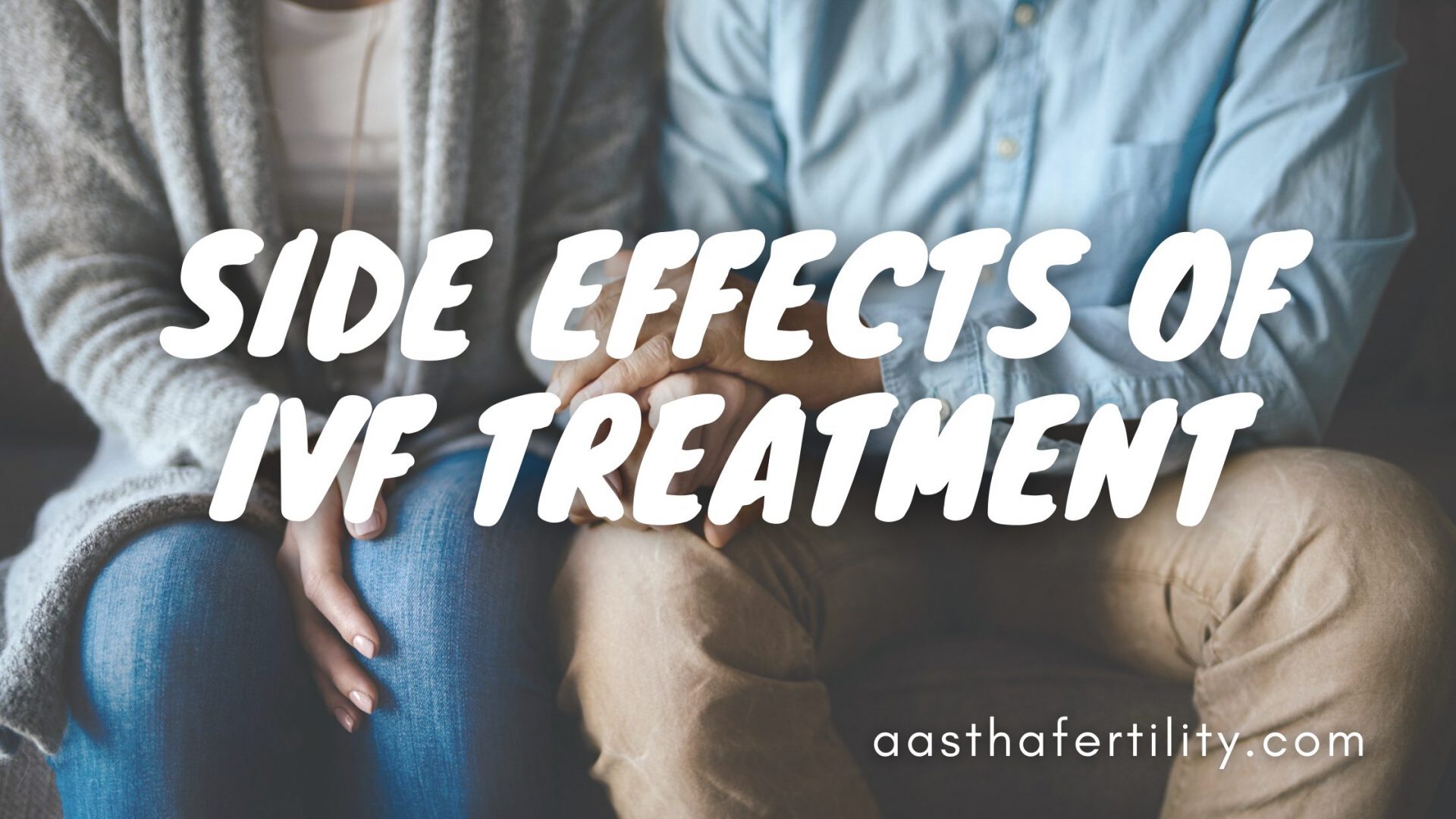
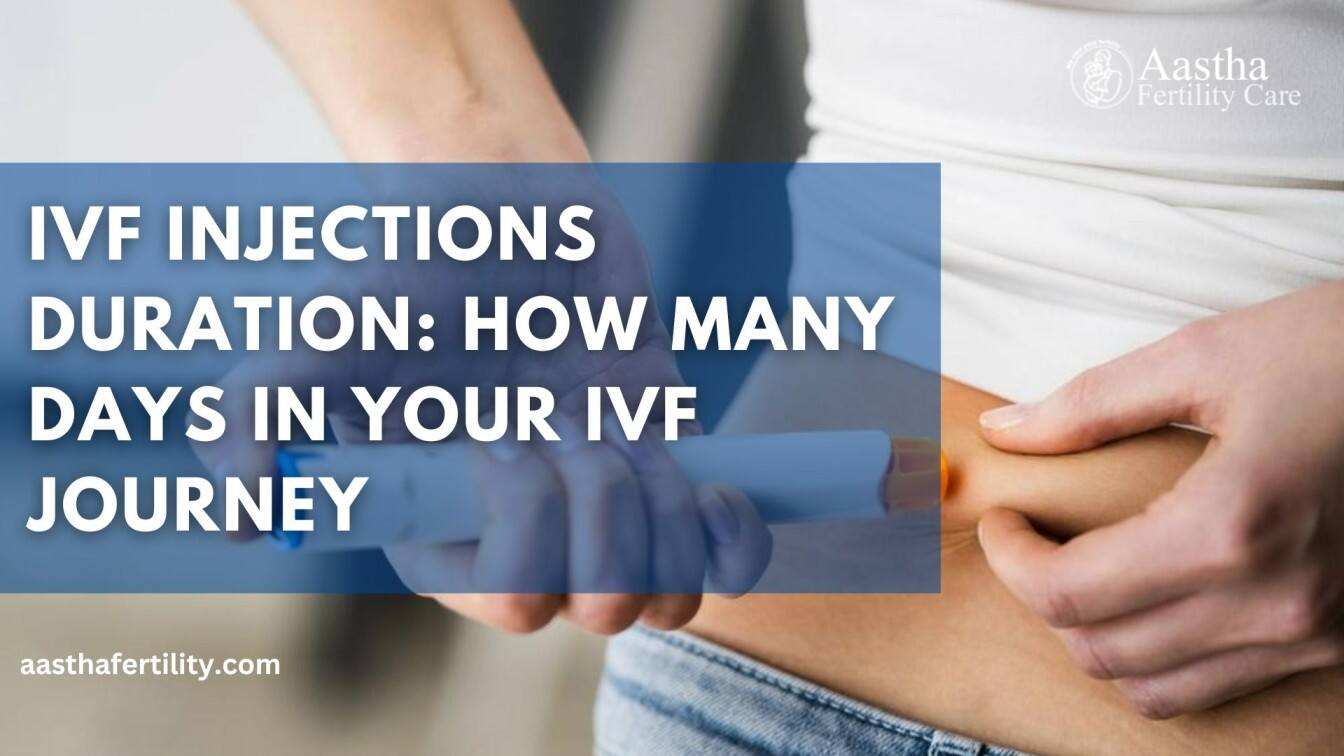
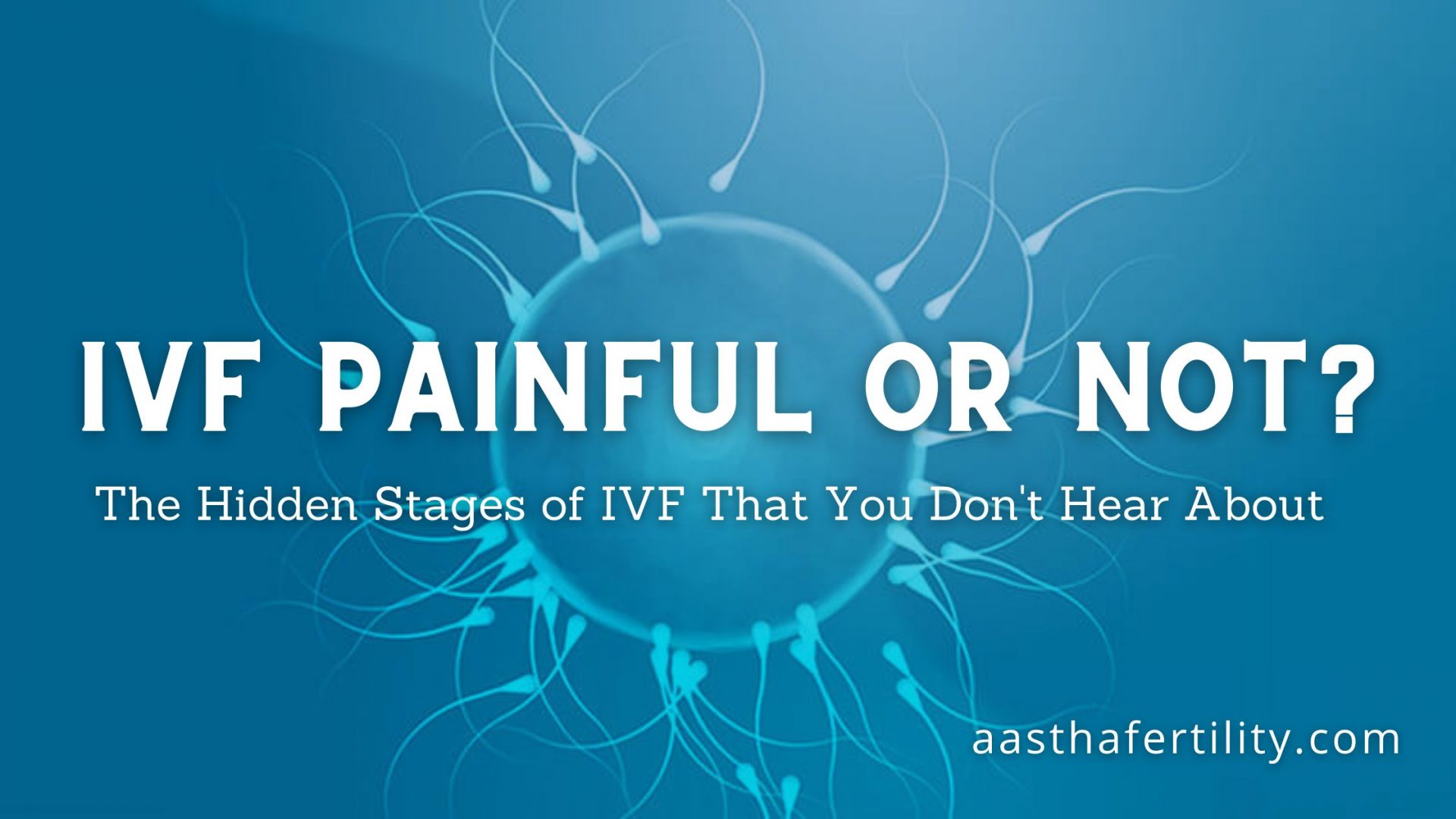

Leave a comment